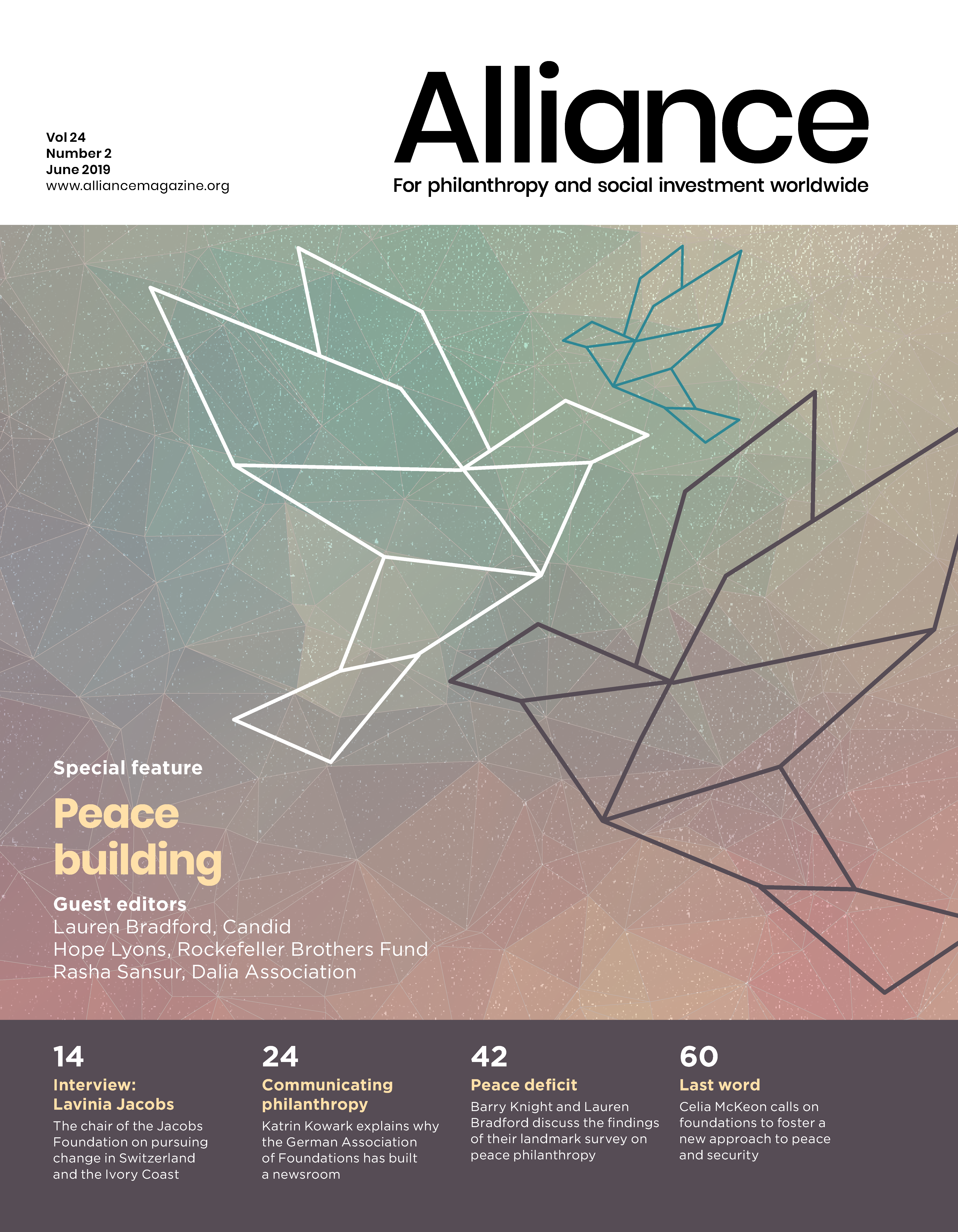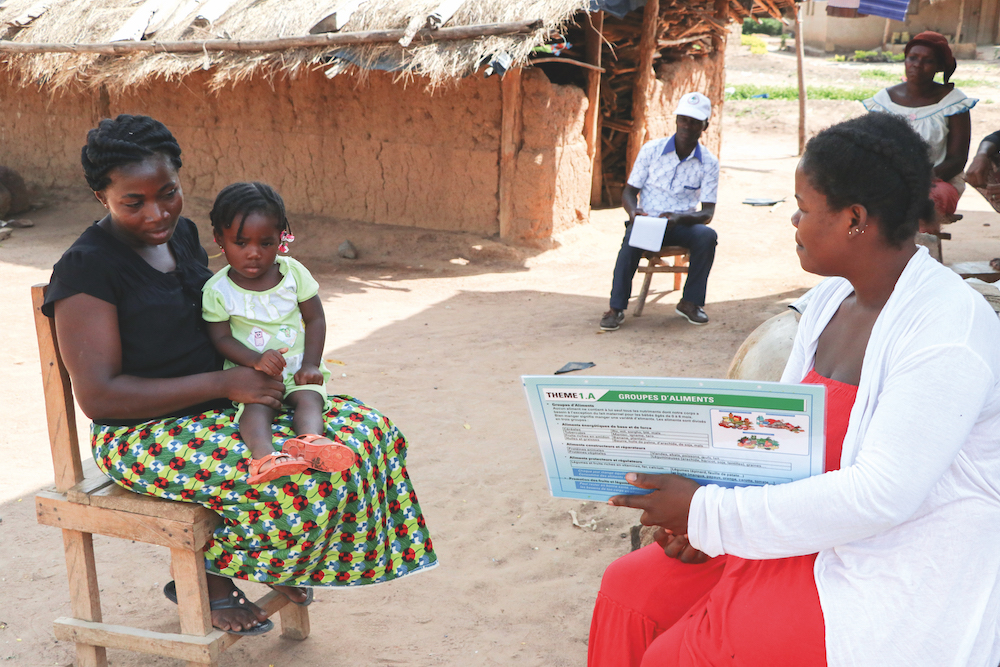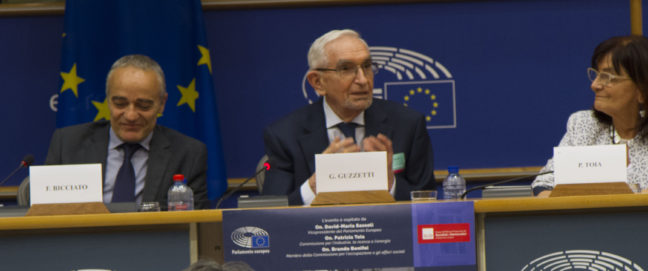 One of Switzerland’s leading foundations, the Jacobs Foundation has forged a reputation for its research-based and system-wide approach to the problems it decides to take on. Its chairperson Lavinia Jacobs talks to Charles Keidan about the foundation’s genesis and the wellsprings of her own approach to philanthropy.
One of Switzerland’s leading foundations, the Jacobs Foundation has forged a reputation for its research-based and system-wide approach to the problems it decides to take on. Its chairperson Lavinia Jacobs talks to Charles Keidan about the foundation’s genesis and the wellsprings of her own approach to philanthropy.
How has your personal family background and business shaped your philanthropy?
You’re probably already aware that my father [Klaus] was a significant entrepreneur. In the 1990s, he founded Adecco, an HR solutions provider, and Barry Callebaut, a manufacturer of cocoa and chocolate products. Both companies are now leaders in their respective global markets and I think this continued drive to go forward is something that served him both personally and in business, and most importantly is why he created the Jacobs Foundation in 1989. He was extremely socially committed from a very early age. He strongly believed that each person should have equal opportunities regardless of any social or financial background and that’s how I still try to run the Jacobs Foundation. And I think his continued ambition to make the world a better place is something that has affected me and my approach very clearly.
When did you become more actively involved?
I got more involved when I was about 24 and joined the board when I was about 28, but of course we visited a lot of projects in our holidays, so it was always a part of my life.
So you took time off from leisure to learn about social issues?
Sure. One visit I remember very well was to a project in Nicaragua. It was the first time I really saw the problem and understood the research behind it. We visited the school and when I spoke to the children there, you could see that you were really having an impact on their lives. I was about 20.
Did you know at that point that you would want to focus as much on your family’s philanthropy as on your family’s business?
I’m not involved in the family business. I have my own investments but they are separate. I think for me, it was always clear that philanthropy was important, perhaps because of talking to my father and understanding his ambition. He was a great role model. And seeing that not every child has the same opportunities as I have had, had a big impact on me, too.
For me personally, it’s very important that whatever we do has impact and is sustainable, at least on paper, because you never know what might happen in fact especially if you are in countries such as the Ivory Coast or Latin America…
How did you decide how much time to spend on philanthropy and how much to spend on your business pursuits?
It depends how much is required. There are times when I spend more time on the foundation – weeks or months – and then other weeks and months where I spend more time on business. I was always clear that I wanted to spend at least 20 per cent of my time on the foundation, I think that’s really needed.
What percentage of money do you decide that you want to allocate to philanthropy as opposed to personal use or investments?
I have a professional approach. We have annual dividends from the business, so we know how much we have to work with – so you have a budget, we have a clear strategy and, from there, you see what projects there are, and you think what you need and what makes sense.
Is the budget based on a certain amount of your wealth or profits that the business generates? Or is it more of a sense of what you want to give over your lifetime?
First of all, it’s really the dividends that we receive. Obviously we can’t spend more than what we get so that’s the limit. Then it’s really a question of strategy. We know we want to fund research because that’s what we’re known for, we always fund research-based projects. Of course, we have great ideas or projects on our table that are just too expensive for us, so if we think something could work or be really interesting, we partner. Like TRECC, for example – if we hadn’t found someone to come in with us, we couldn’t have gone as far as we have done. So it always depends on what we want to achieve. For me personally, it’s very important that whatever we do has impact and is sustainable, at least on paper, because you never know what might happen in fact especially if you are in countries such as the Ivory Coast or Latin America… but ideally it should be sustainable.
That’s something that’s recently become clear to me, that nowadays foundations should partner more because the big questions will only be resolved and the big changes will only be achieved if the money is put together and foundations work together.
You mentioned the Transforming Education in Cocoa Communities (TRECC) programme – one that your foundation is associated with and you have a particular approach around systems change. You’re focusing on high quality education in the Ivory Coast. How did you choose that theme and that country?
All over the world, there are education programmes, but still children go to school and come out unable to read so something is obviously going wrong. It’s really key that these kids get a certain quality of education, so that’s why we very strongly push for quality in education and not just education full stop. The Ivory Coast offered a good opportunity because, first of all the Ivorian government has placed a big importance on increasing the educational outcomes of children and youth throughout the country and, second, the cocoa and chocolate industry together with the Ivorian government have committed themselves to improving the lives of cocoa farmers in a coordinated way. The third advantage was that the entrepreneurial power of smallholder farmers in the country is growing and there are civil society organisations committed to increasing the quality of education that Ivorian kids receive.
I can see that partnership with government and civil society in the Ivory Coast is a big part of it as well as your knowledge of the chocolate and cocoa industry. But I also see that there are partnerships with other foundations – can you explain how that works and how that’s going?
We have two partners, the Bernard van Leer Foundation and the UBS Optimus Foundation. They both bring their knowledge and their opinions and of course their money. That’s something that’s recently become clear to me, that nowadays foundations should partner more because the big questions will only be resolved and the big changes will only be achieved if the money is put together and foundations work together.
How optimistic are you about the changes you hope to see in the Ivory Coast being achieved?
I’m pretty optimistic that we’ll get there and that change is possible in the way we envisioned it. Of course there are always variables and things that you can’t influence, but at the moment I’m really optimistic.
I presume you visit periodically. When you do go, do you visit government officials, or the children in the schools, or do you combine a whole range of visits and meetings?
Normally, I see people from the government, I see some partner organisations and I see the staff in the office and what kind of issues and challenges they face. The last time I was there, I didn’t visit the schools because they’re a bit remote and I was only there for a couple of days, but normally, yes, we do that, we go to see the schools.
You mentioned the idea of bringing foundations together with other players to achieve system change, in the way you’re doing in the Ivory Coast. Co-Impact, of whom you will probably have heard, is another big initiative in the same vein. Could you expand your views on that cross-sector collaborative approach?
I really like this development because I think, even if you have an awful lot of money to spend, it’s always good to collaborate. It’s not only the money, it’s also a question of expertise. If you have partners, you can share your thoughts and that’s what we see now in our partnership with the Bernard van Leer Foundation and the UBS Optimus Foundation. Another benefit is that it’s good to have people challenging your approach. Sometimes you have different views or different approaches and it’s really helpful to share.
If we could turn to philanthropy in Europe and in particular Switzerland, you’re based in London and Zurich, you’re knowledgeable about both the UK and Switzerland. Are you seeing a greater visibility of philanthropy in Switzerland, and in particular in Zurich, or do you feel isolated in the work that you’re doing?
The Jacobs Foundation is one of the biggest foundations in Switzerland but there are so many other foundations here, too. I think there are over 13,000 charitable foundations in Switzerland. Combined, they have roughly 100 billion Swiss francs in assets and they spend 2.5 billion of them every year. So there is a lot of money. And of course all the big players know each other. What is not so good is that often foundations don’t really speak openly about what they are doing. In my opinion, that has got better over the last two or three years. People have started to talk, you can see what other foundations are doing. I think that’s a development that’s mainly driven by the influence of the Anglo-American approach. It’s more common to talk about your work as a foundation and the sector is more professional. I think that development is happening now in Switzerland and it’s really helpful.
Even if you have an awful lot of money to spend, it’s always good to collaborate. It’s not only the money, it’s also a question of expertise. If you have partners, you can share your thoughts and that’s what we see now in our partnership with the Bernard van Leer Foundation and the UBS Optimus Foundation.
What do you think are some of the barriers to more public conversations about philanthropy? Is it that wealthy people are worried about putting their heads above the parapet and being criticised either for their philanthropy or indeed for their wealth? Or is it just a feeling that philanthropy should be done more privately?
I think you’re right. Normally people, and especially rich people, don’t want to stick their neck out because we feel uncomfortable doing so. And that’s probably to do with Swiss history. But I think it’s changing because, first of all, as we’ve talked about, there’s a trend for bigger foundations to put money together, which is happening here in Switzerland, too, and then there are young people who don’t feel the same reticence as their parents and grandparents did. They use new media, they are more open about their views and things are moving.
You mentioned a generational element there. You’re obviously from a younger generation – you’re currently in your late 30s. Do you feel that in the context of your own family foundation you’re doing things differently? Maybe building on what your older family members have done, but having a different approach, or is it more a case of continuity?
I’m building upon the fundamentals – I would never touch those – but I’m certainly doing things differently. I have a different approach and different personality from my father.
What do you think are the defining features of the way you approach philanthropy?
I think it’s the concern for impact and also sustainability – that’s really key for me – and it’s also running the foundation a bit more like a business than a charitable organisation.

Jacobs with then Ivorian prime minister, Daniel Kablan Duncan, after signing a Memorandum of Understanding.
Another appears to be a willingness not just to be rigorous and research-driven but also to use that research to take challenging decisions sometimes. Can you give me an example of where you have been willing to make a judgement about what you think is right but may not be popular?
In the Swiss context, our attitude is that early childhood education is important, as it is elsewhere. This led us to start Ready! a campaign throughout Switzerland that focuses on the formative early childhood years. It brings partners active in the early childhood sector together to work toward a comprehensive early childhood policy. If there are nurseries, there should be quality standards, which are arguably lacking in Switzerland.
However, this notion has not been popular. There are some voices saying that we are trying to push to have education from zero to kindergarten made mandatory and they argue that we are funding research by people who would later profit from the results of that research. They also argue that we are basically pushing the government to spend more money on something where it’s not really needed.
So, in your experience, foundations might need to enter into riskier territory to advocate policy changes.
I think we all face these situations. In terms of quality early education, the very neutral approach based on research can easily be used against you, whether by policymakers or interest groups, and that’s happened here in Switzerland. Sometimes, it certainly would have been easier not to have started the Ready! campaign but, in the Swiss context, it makes sense to have the conversation.
Philanthropy is gaining more attention and news outlets show the broader public what foundations are doing. It also gives foundations an idea of where to look and who to speak to if they are looking for new partners. I think knowledge is key.
You’ve got a federal system in Switzerland. Do you see any variations in the progress of philanthropy in, say, Zurich as opposed to Geneva or other parts of the country? Do you think Zurich leads Swiss philanthropy or would it be wrong to make that claim?
Of course, it’s very different in Zurich and in Geneva. Their approach to philanthropy is different. Is there one leader? No, I wouldn’t say so. It’s just different.
What is the main difference?
In Geneva, you have large international communities and in Zurich it’s mainly Swiss foundations established by Swiss families.
As philanthropy grows in visibility, how important do you think it is for the philanthropy sector globally, as well as society at large, to have philanthropy-focused media, whether that’s Alliance or Stanford Social Innovation Review or others?
I think it’s really important. Because nowadays you have all these news media, but they don’t really go into a topic in depth, so specialist magazines are always helpful if you have an interest in an area, and that’s true for philanthropy. And as you said, philanthropy is gaining more attention and news outlets show the broader public what foundations are doing. It also gives foundations an idea of where to look and who to speak to if they are looking for new partners. I think knowledge is key. As I said earlier, it was lacking in Switzerland up to the last couple of years, because nobody had an idea what the other foundations were doing. A philanthropy-focused media surely helps in this regard.
Charles Keidan is editor of Alliance magazine.
Email: charles@alliancemagazine.org
Twitter: @charleskeidan








Comments (0)